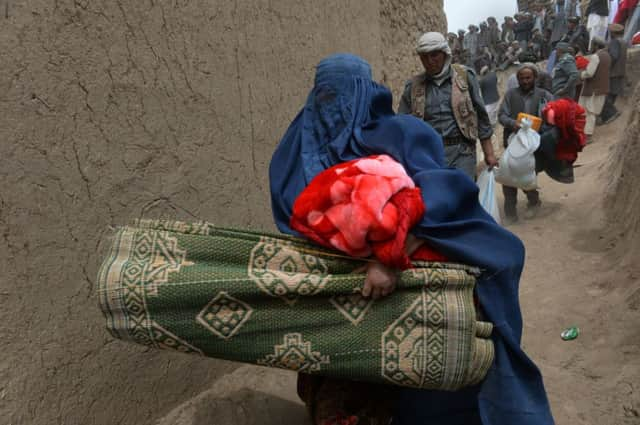Day of mourning as aid reaches landslide survivors


The threat of more landslides in the village of Abi Barik in Badakhshan province remains, Wais Ahmad Barmak, minister for rural rehabilitation said.
Aid groups and government agencies have arrived in the remote area in northeastern Afghanistan with food, tents for shelter and water.
Advertisement
Hide AdAdvertisement
Hide AdMatt Graydon, spokesman for the International Organisation of Migration, an intergovernmental group, said it is bringing solar-powered lanterns, blankets and shelter kits.
After a visit to the area yesterday, he said that some residents have gone to nearby villages to stay with family or friends, but others have slept out in the open. He added: “Some people left with almost nothing.”
More than 2,000 people are feared to have been killed after a massive landslide struck the remote province of Badakhshan, which borders Tajikistan and China, on Friday.
Health charity Merlin, which is part of Save the Children, was among the first organisations on the scene, providing crucial medical assistance to families caught up in the disaster.
Andrew Morris, Unicef’s chief in the region, yesterday said the area had been ravaged by the “exceptionally large” mudslide.
He said: “There is devastation because of the landslide. Half of one village has been completely buried by the mud; the other half of the village is empty because people evacuated in case the landslide slid further.
“In another village, people have moved because they are afraid of more landslides. So a little bit of chaos. And several hundred people living under tents.
“Yesterday [Saturday] afternoon the rescue effort stopped. The whole area has been declared a burial ground, our staff described it as in some places as deep as 50 metres of mud.
Advertisement
Hide AdAdvertisement
Hide Ad“The whole side of the mountain collapsed. Initially, after the first landslide, men from the neighbouring villages all ran to help with search and rescue. But the landslide slid further and killed all of them as well.”
He added: “Our first priority was to get water supplies going – people had just a few bottles of water handed out yesterday by visitors, the local government. At the same time we are urgently looking at sanitation.
“Then we have to help children to overcome this traumatic event. We have got to get them back to school as soon as we can. That is part of the return to normalcy.”
The tragedy is “disastrous” for children, many of whom have been left fatherless by the landslide, Mr Morris warned.
Fathers were the sole breadwinner for many families in the already desperately poor area. Their deaths raises the prospect that villagers could slip into further poverty, malnutrition and death, he warned.
He said: “In that province they are desperately poor, so this added shock can flip someone who is poor into a situation where they can barely survive.
“And then two or three months down the line we will see that the youngest children are not gaining weight, they become malnourished. And that puts them in the cycle of malnutrition disease, and unfortunately death. For communities affected by this, it is not just the immediate response [that matters], we have got to be looking at the follow-up.”
British charities were among the groups providing aid.
Onno Van Manen, acting country director for Save the Children in Afghanistan, said the charity had sent aid workers to the stricken area.
Advertisement
Hide AdAdvertisement
Hide AdHe said: “They have dispatched five ambulances, set up mobile health clinics, and have medical staff on stand-by to support the injured in this disaster.”
Oxfam’s Afghanistan country director, John Watt, said the organisation is “readying a response”.